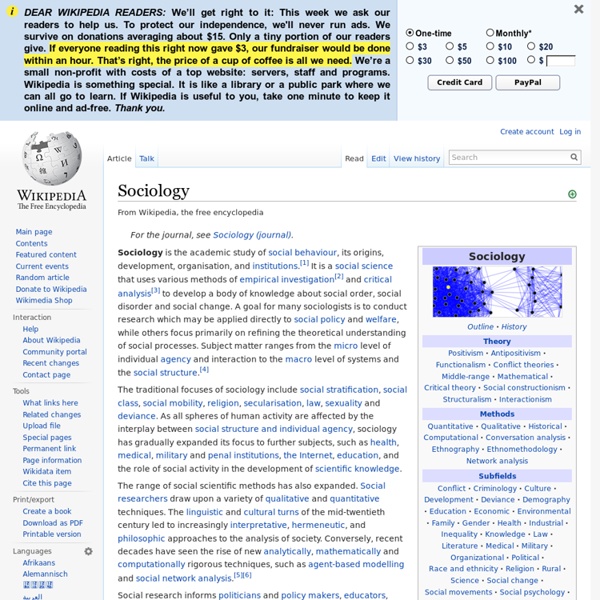Political science
Political science is a social science discipline that deals with systems of government and the analysis of political activity and political behavior.[1] It deals extensively with the theory and practice of politics which is commonly thought of as the determining of the distribution of power and resources. Political scientists "see themselves engaged in revealing the relationships underlying political events and conditions, and from these revelations they attempt to construct general principles about the way the world of politics works."[2] Political science draws upon the fields of economics, law, sociology, history, anthropology, public administration, public policy, national politics, international relations, comparative politics, psychology, political organization, and political theory.
What is the new sociology of Ideas ? A Discussion with Charles Camic and Neil Gross - Transeo Review
Humanities are not so common an object of investigation for social scientists. Other disciplines (intellectual history, political science or even philosophy) tend to challenge the accounts produced by sociologists. Moreover, the sophistication of disciplines such as philosophy or economic analysis can sometimes be a barrier for sociologists working on them. Could you briefly describe your personal trajectory, your education and past interests, and the reasons why you turned to the sociology of ideas ? Charles Camic : Although I “turned” about 10 years ago to using the expression “sociology of ideas” to describe my work, I’ve actually been doing research in this vein onward from my time in graduate school.
Philosophy
Philosophy is the study of general and fundamental problems, such as those connected with reality, existence, knowledge, values, reason, mind, and language.[1][2] Philosophy is distinguished from other ways of addressing such problems by its critical, generally systematic approach and its reliance on rational argument.[3] In more casual speech, by extension, "philosophy" can refer to "the most basic beliefs, concepts, and attitudes of an individual or group".[4] The word "philosophy" comes from the Ancient Greek φιλοσοφία (philosophia), which literally means "love of wisdom".[5][6][7] The introduction of the terms "philosopher" and "philosophy" has been ascribed to the Greek thinker Pythagoras.[8] Areas of inquiry
Social influence
Morton Deutsch and Harold Gerard described two psychological needs that lead humans to conform to the expectations of others. These include our need to be right (informational social influence), and our need to be liked (normative social influence).[3] Informational influence (or social proof) is an influence to accept information from another as evidence about reality. Informational influence comes into play when people are uncertain, either because stimuli are intrinsically ambiguous or because there is social disagreement. Normative influence is an influence to conform to the positive expectations of others. In terms of Kelman's typology, normative influence leads to public compliance, whereas informational influence leads to private acceptance.
Geography
Geography (from Greek γεωγραφία, geographia, lit. "earth description"[1]) is a field of science dedicated to the study of the lands, the features, the inhabitants, and the phenomena of the Earth.[2] A literal translation would be "to describe or write about the Earth". The first person to use the word "geography" was Eratosthenes (276–194 BC).[3] Four historical traditions in geographical research are spatial analysis of the natural and the human phenomena (geography as the study of distribution), area studies (places and regions), study of the man-land relationship, and research in the Earth sciences.[4] Nonetheless, modern geography is an all-encompassing discipline that foremost seeks to understand the Earth and all of its human and natural complexities - not merely where objects are, but how they have changed and come to be. Geography has been called "the world discipline" and "the bridge between the human and the physical science".
Social psychology
Social psychologists therefore deal with the factors that lead us to behave in a given way in the presence of others, and look at the conditions under which certain behavior/actions and feelings occur. Social psychology is concerned with the way these feelings, thoughts, beliefs, intentions and goals are constructed and how such psychological factors, in turn, influence our interactions with others. In addition to the split between psychology and sociology, there has been a somewhat less pronounced difference in emphasis between American social psychologists and European social psychologists. As a broad generalization, American researchers traditionally have focused more on the individual, whereas Europeans have paid more attention to group level phenomena (see group dynamics).[3][page needed] History[edit] Intrapersonal phenomena[edit]
Psychology
Psychology is an academic and applied discipline that involves the scientific study of mental functions and behaviors.[1][2] Psychology has the immediate goal of understanding individuals and groups by both establishing general principles and researching specific cases,[3][4] and by many accounts it ultimately aims to benefit society.[5][6] In this field, a professional practitioner or researcher is called a psychologist and can be classified as a social, behavioral, or cognitive scientist. Psychologists attempt to understand the role of mental functions in individual and social behavior, while also exploring the physiological and biological processes that underlie cognitive functions and behaviors. While psychological knowledge is often applied to the assessment and treatment of mental health problems, it is also directed towards understanding and solving problems in many different spheres of human activity. Etymology
Cousins of Neanderthals Left DNA in Africa, Scientists Report
The geneticists reached this conclusion, reported on Thursday in the journal Cell, after decoding the entire genome of three isolated hunter-gatherer peoples in Africa, hoping to cast light on the origins of modern human evolution. But the finding is regarded skeptically by some paleoanthropologists because of the absence in the fossil record of anything that would support the geneticists’ statistical calculations. Two of the hunter-gatherers in the study, the Hadza and Sandawe of Tanzania, speak click languages and carry ancient DNA lineages that trace to the earliest branchings of the human family tree. The third group is that of the forest-dwelling pygmies of Cameroon, who also have ancient lineages and unusual blood types. The geneticists, led by Joseph Lachance and Sarah A.



